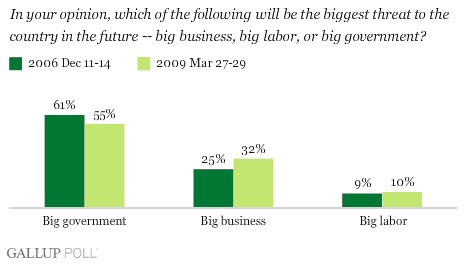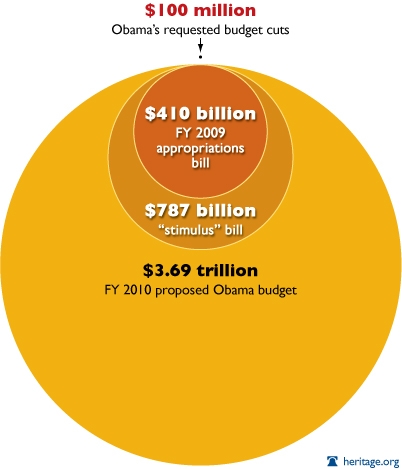In a recent Gallup poll, the American people were asked what poses the biggest threat to the country’s future – big business, big labor or big government. By a margin of almost 2 to 1, big government won.
The result is not surprising. A defense build-up to fight two wars and an unprecedented expansion of Federal involvement in the financial services and automotive industries, not to mention a proposed government run health program, is valid reason for national concern over the growth of government.
As the following Heritage Foundation graphic illustrates, President Obama’s call for $100 million in cuts from is cabinet is a quintessential example of draining the ocean with an eyedropper.
Harvard economics professor Greg Mankiw puts Obama’s call for $100 million in Cabinet cuts into perspective: $100 million represents .003 percent of $3.5 trillion. “Imagine that the head of a household with annual spending of $100,000 called everyone in the family together to deal with a $34,000 budget shortfall. How much would he or she announce that spending had to be cut? By $3 over the course of the year–approximately the cost of one latte at Starbucks. The other $33,997? We can put that on the family credit card and worry about it next year.”
The anger expressed by hundreds of thousands of tea party protesters on April 15 is a call for action over the government’s profligate ways.
Patrick Henry once said, “I know of no way of judging of the future but by the past.” It is therefore instructive to look back at how America has dealt with previous similar phenomena.
The current growth of government is reminiscent of what was experienced in the 1930s and 1940s – coming out of the double whammy of the Great Depression and World War II. The New Deal and war effort left America with a bloated an unneeded national government. What Congress and the President did at that time is a model for what should be done today.
Committee on Reduction of Non-essential Federal Expenditures
Senator Harry F. Byrd, Sr. (D-VA), famous for his “pay as you go”, anti-debt way of financing government, was an internationalist and strongly supported Franklin Roosevelt’s foreign policy, including the U.S’s entry into World War II. However, Byrd broke with the Roosevelt Administration and became a vocal and ardent opponent of the New Deal. When a bill came before the Senate to increase taxes to underwrite the defense buildup, Byrd complained that it was “outrageous” to impose taxes instead of looking for ways to economize. He added a provision to the Revenue Act of 1941 to establish a joint congressional committee to look into ways of eliminated nonessential expenditures. Byrd was named chairman of the Joint Committee on Reduction of Non-essential Federal Expenditures. Every Federal agency was subject to the Byrd Committee’s scrutiny. He especially targeted Roosevelt’s New Deal agencies that seemed, to Byrd, to reflect a growing socialism that he strongly opposed. The Civilian Conservation Corps was one of the first victims, killed in July 1942 after Byrd claimed that with the United States now at war, the jobs it was designed to create were no longer needed. Byrd would serve on the joint committee, sometimes as its chairman even when Republicans controlled the Congress, for the next 20 years. But whether he was chairman or not, it was always known as the Byrd Committee and under the tutelage of the conservative Virginia Democrat, scores of agencies and programs were eliminated and millions of dollars were saved.
The rationale for the Joint Committee on Reduction of Nonessential Federal Expenditures in 1941 is as evident today. Congress should learn from the history of World War II and the New Deal and create such a committee again today.
A Hoover Commission
Rather than ask his Cabinet to sacrifice a latte a year, President Obama should take action that compliments the establishment of a Congressional budget-cutting committee by taking action similar to that President Harry S Truman – create a Commission on Organization of the Executive Branch of the Government.
When Truman took office, many Americans, and members of Congress on both sides of the aisle, believed the Executive branch and the role of government had expanded to too large a degree during the Roosevelt era. There was a call for government streamlining, both for efficiency and as a curb on excessive control, regulation and competition and duplication of the private sector.
To facilitate government reform and reduction, Truman established the Commission on Organization of the Executive Branch of the Government. It was commonly known as the Hoover Commission after the person Truman appointed as its chairman, former President Herbert Hoover.
To demonstrate his commitment to his campaign pledge of bipartisanship, Obama would be wise to appoint his predecessor from the other party, former President George W. Bush, as chairman of his cost-cutting commission. The Bush Commission could give bipartisan flavor to the task of eliminating Executive Branch activities that are no longer necessary. Given the growth of government that started during the Bush era, the former president could serve the country and help restore his fiscal bona fides by heading the blue ribbon commission. A Bush Commission, modeled after the Base Closure and Realignment Commission, that forces spending elimination unless Congress rejects an entire package, would be an effective way to assure that reforms are implemented, not put on a shelf to collect dust like so many other government reports.
Any elected official or political observer who fails to recognize the passion and significance of the tea party protests does so at great peril. Citizen angst with the exploding size and cost of government is the beginning of a grass roots movement not seen in America since the passage of Proposition 13 in California in 1978 led to the election of Ronald Reagan as president in 1980. Assuaging the aggravation of a significant portion of the electorate over big government would be a wise, bipartisan action.
- The Most Progressive Budget in Virginia’s History - December 21, 2019
- When is a Clean Water Act Permit Needed? - December 21, 2019
- Should U.S. Consider Modern Monetary Theory to Improve Economy? - December 21, 2019
